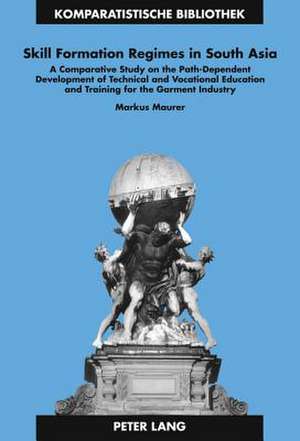Skill Formation Regimes in South Asia: Komparatistische Bibliothek / Comparative Studies Series / B, cartea 21
Autor Markus Maureren Limba Engleză Hardback – 12 ian 2011
Preț: 580.21 lei
Preț vechi: 630.66 lei
-8% Nou
Puncte Express: 870
Preț estimativ în valută:
111.02€ • 116.23$ • 91.86£
111.02€ • 116.23$ • 91.86£
Carte tipărită la comandă
Livrare economică 02-08 aprilie
Preluare comenzi: 021 569.72.76
Specificații
ISBN-13: 9783631600207
ISBN-10: 3631600208
Pagini: 449
Ilustrații: 2 fig., 11 tables
Dimensiuni: 151 x 216 x 35 mm
Greutate: 0 kg
Ediția:Nouă
Editura: Peter Lang Gmbh, Internationaler Verlag Der W
Seria Komparatistische Bibliothek / Comparative Studies Series / B
ISBN-10: 3631600208
Pagini: 449
Ilustrații: 2 fig., 11 tables
Dimensiuni: 151 x 216 x 35 mm
Greutate: 0 kg
Ediția:Nouă
Editura: Peter Lang Gmbh, Internationaler Verlag Der W
Seria Komparatistische Bibliothek / Comparative Studies Series / B
Notă biografică
Markus Maurer is a Senior Lecturer in the field of secondary and vocational education at the University of Zurich. His research focuses on comparative policy analysis in education and on vocational education and training in developing countries.
Cuprins
Contents: Political economy of skill formation in developing countries ¿ In-firm and out-of-firm skill formation ¿ Role of employers¿ associations in education and training policy making ¿ Implementation of educational reforms ¿ Path-dependent development of education and training ¿ Historical-institutionalist perspective ¿ Historical-comparative study ¿ Industrial development ¿ Educational development and the role of multi- and bilateral donors ¿ Development of the garment industry in South Asia from a historical and political-economic perspective.


















